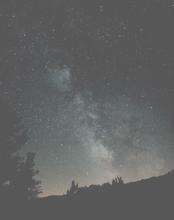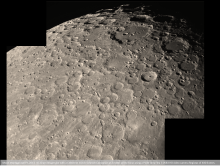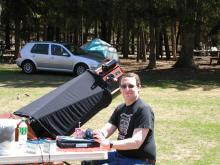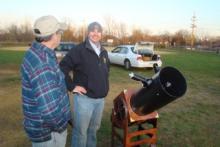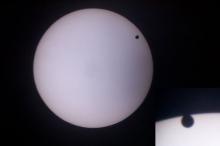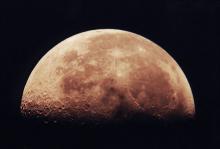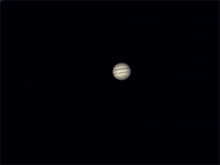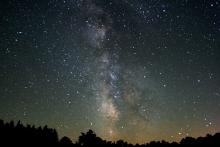Don't miss the meeting, coming up this week!
Science Daily

Astronomy news. New! Earth-like extrasolar planet found; double helix nebula; supermassive black holes, astronomy articles, astronomy pictures. Updated daily.
Updated: 33 min 26 sec ago
Stellar collisions produce strange, zombie-like survivors
Densely packed, fast-moving stars at the Milky Way's center can collide with each other. New research uses simulations to explore the outcomes of these collisions. Some collisions are more like 'violent high fives' while others are full-on mergers.
NASA's Webb probes an extreme starburst galaxy
A team of astronomers has used NASA's James Webb Space Telescope to survey the starburst galaxy Messier 82 (M82). Located 12 million light-years away in the constellation Ursa Major, this galaxy is relatively compact in size but hosts a frenzy of star formation activity. For comparison, M82 is sprouting new stars 10 times faster than the Milky Way galaxy.
Unlocking supernova stardust secrets
New research has discovered a rare dust particle trapped in an ancient extra-terrestrial meteorite that was formed by a star other than our sun.
ALMA finds new molecular signposts in starburst galaxy
The ALMA radio telescope has detected more than 100 molecular species, including many indicative of different star formation and evolution processes, in a galaxy where stars are forming much more actively than in the Milky Way. This is far more molecules than were found in previous studies. Now the team will try to apply this knowledge to other galaxies.
Astronomers conduct first search for forming planets with new space telescope
Planets form in disks of dust and gas called protoplanetary disks that whirl around a central protostar during its final assembly.
Persistent hiccups in a far-off galaxy draw astronomers to new black hole behavior
Astronomers have found that a previously quiet black hole, which sits at the center of a galaxy about 800 million light years away, has suddenly erupted, giving off plumes of gas every 8.5 days before settling back to its normal, quiet state.
Astronomers unveil strong magnetic fields spiraling at the edge of Milky Way's central black hole
A new image from the Event Horizon Telescope (EHT) collaboration has uncovered strong and organized magnetic fields spiraling from the edge of the supermassive black hole Sagittarius A* (Sgr A*). Seen in polarized light for the first time, this new view of the monster lurking at the heart of the Milky Way Galaxy has revealed a magnetic field structure strikingly similar to that of the black hole at the center of the M87 galaxy, suggesting that strong magnetic fields may be common to all black holes.
Distant 'space snowman' unlocks mystery of how some dormant deep space objects become 'ice bombs'
Researchers found that the double-lobed object, which is officially named Kuiper Belt Object 486958 Arrokoth and resembles a snowman, may have ancient ices stored deep within it from when the object first formed billions of years ago.
Turbulence within solar transients imaged
Scientists captured images showing the development of turbulence as a Coronal Mass Ejection (CME) interacted with the ambient solar wind in the circumsolar space.
'Cosmic cannibals' expel jets into space at 40 percent the speed of light
Astronomers have measured the speed of fast-moving jets in space, crucial to star formation and the distribution of elements needed for life. The jets of matter, expelled by stars deemed 'cosmic cannibals', were measured to travel at over one-third of the speed of light -- thanks to a groundbreaking new experiment.
Sleeping supermassive black holes awakened briefly by shredded stars
Astronomers have concluded that an obscure class of galaxies known as Compact Symmetric Objects, or CSOs, are not young as previously thought but rather lead relatively short lives.
Tiniest 'starquake' ever detected
An orange dwarf star has yielded the tiniest 'starquakes' ever recorded, measured by an international team of scientists.
Astronomers discover 49 new galaxies in under three hours
New work aimed to study the star-forming gas in a single radio galaxy. Although the team didn't find any star-forming gas in the galaxy they were studying, they instead discovered other galaxies while inspecting the data. In total, the gas of 49 galaxies was detected.
James Webb Space Telescope captures the end of planet formation
How much time do planets have to form from a swirling disk of gas and dust around a star? A new study gives scientists a better idea of how our own solar system came to be.
Signs of life would be detectable in single ice grain emitted from extraterrestrial moons
Could life be found in frozen sea spray from moons orbiting Saturn or Jupiter? New research finds that life can be detected in a single ice grain containing one bacterial cell or portions of a cell. The results suggest that if life similar to that on Earth exists on these planetary bodies, that this life should be detectable by instruments launching in the fall.
Secrets of the Van Allen belt revealed in new study
A challenge to space scientists to better understand our hazardous near-Earth space environment has been set in a new study.
High school students contribute to exoplanet discovery
A group of high school students from Oakland, California, made contributions to the field of exoplanet research. Researchers worked with the students to use backpack-sized digital smart telescopes. These young citizen scientists played a role in observing and confirming the nature of a warm and dense sub-Saturn planet, known as TIC 139270665 b, orbiting a metal-rich G2 star.
Scientists find one of the most ancient stars that formed in another galaxy
The first generation of stars transformed the universe. Inside their cores, simple hydrogen and helium fused into a rainbow of elements. When these stars died, they exploded and sent these new elements across the universe. The iron running in your veins and the calcium in your teeth and the sodium powering your thoughts were all born in the heart of a long-dead star.
Astrophysicist's research could provide a hint in the search for dark matter
Dark matter is one of science's greatest mysteries. Although it is believed to make up about 85 percent of the cosmos, scientists know very little about its fundamental nature. Research provides some of the most stringent constraints on the nature of dark matter yet. It also revealed a small hint of a signal that, if real, could be confirmed in the next decade or so.
Simulated microgravity effects cause marked changes in gene expression rhythms in humans, study finds
Simulated effects of microgravity, created by 60 days of constant bed rest, severely disrupts rhythmic gene expression in humans, according to a new study.

